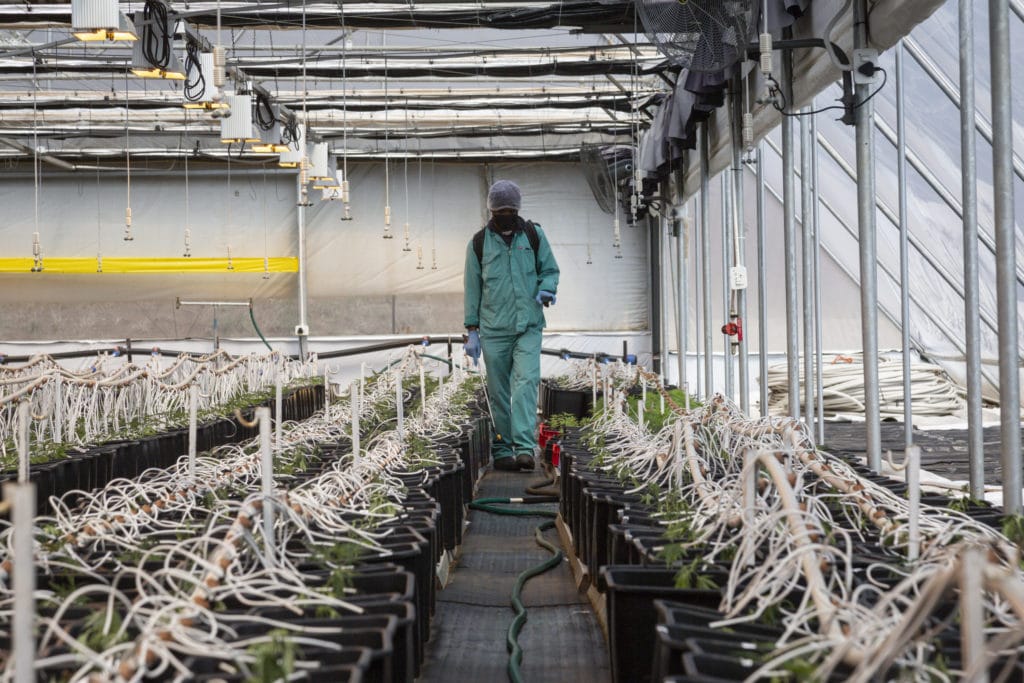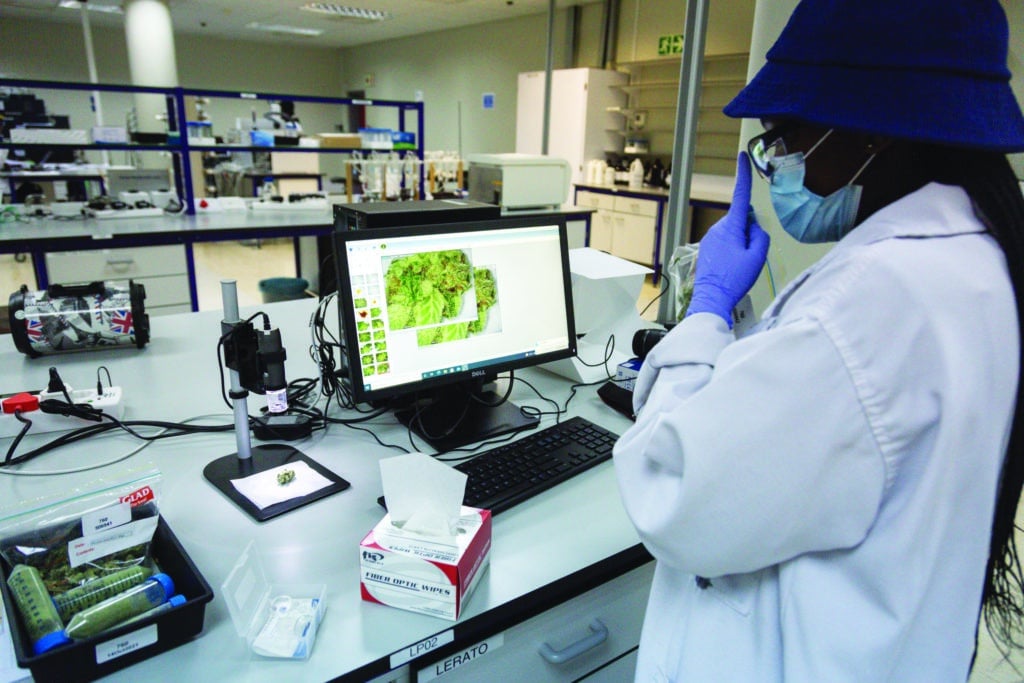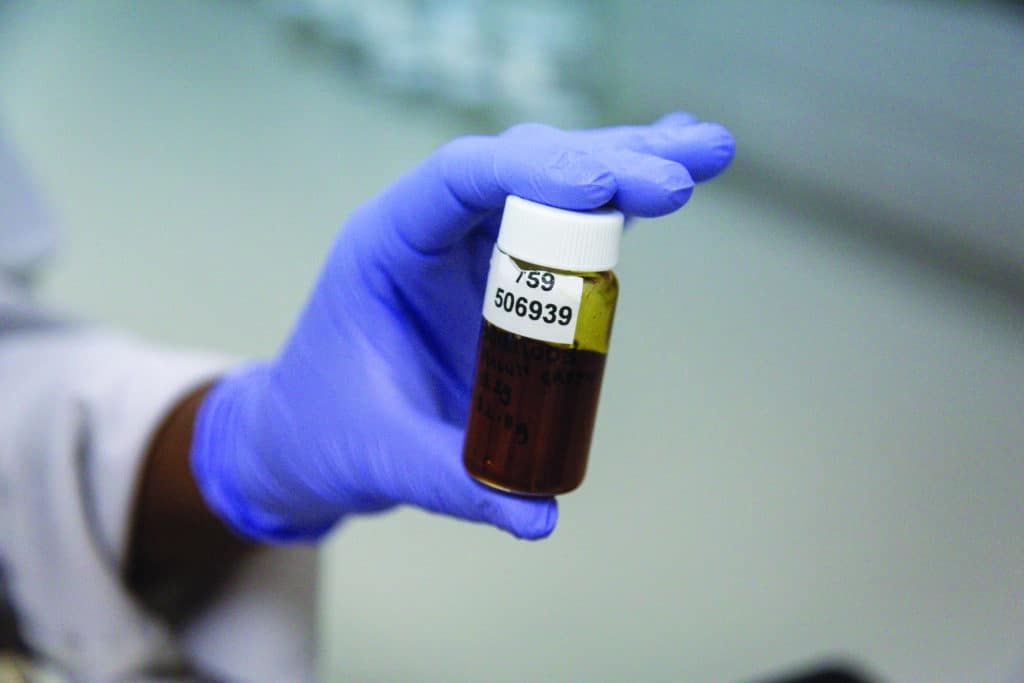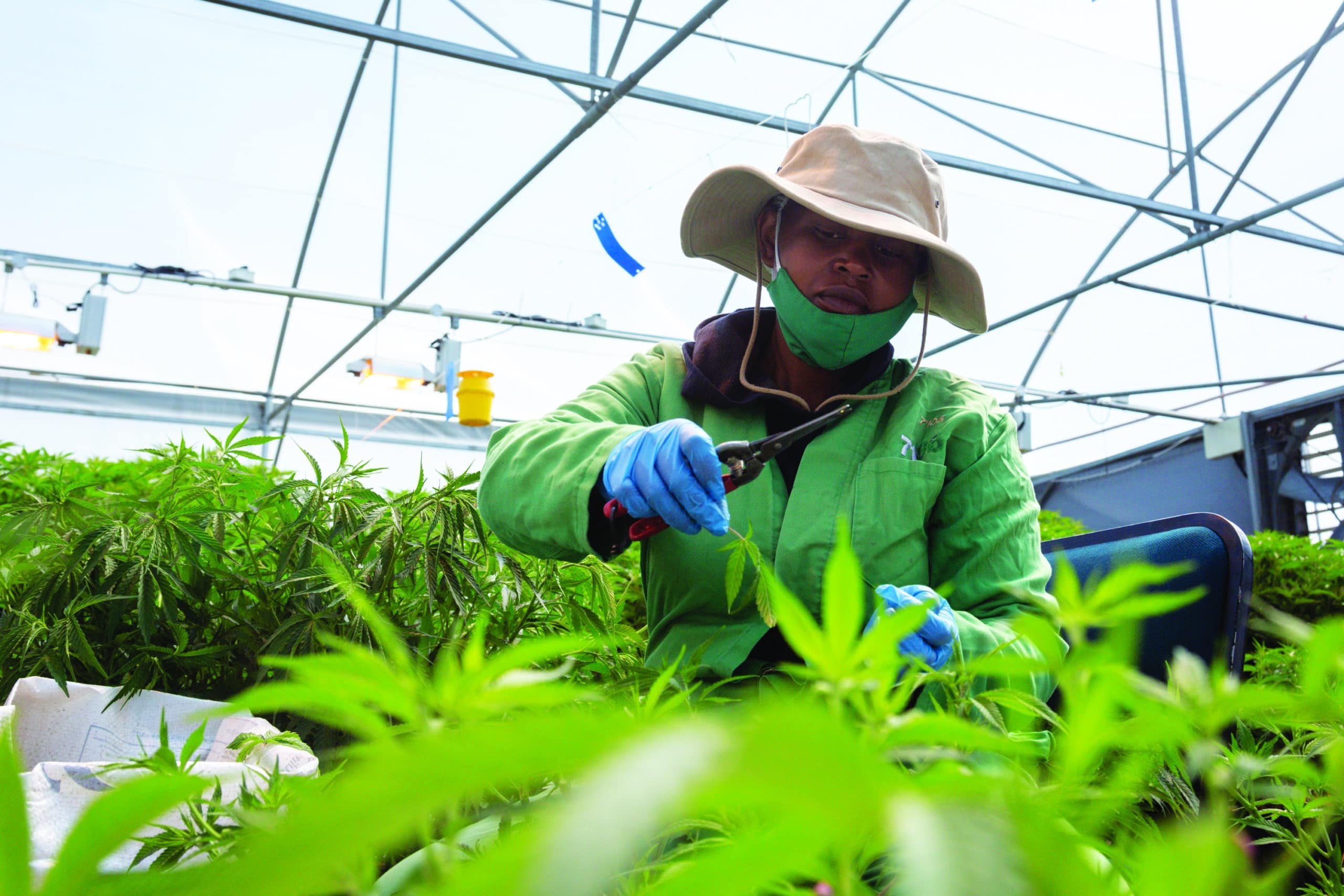Southern Africa has been largely slow to capitalize on the growing global billion-dollar industry of medical cannabinoid products. One company in Lesotho is aiming to bridge that gap, and has become the first medical cannabis company on the continent cleared to export their pharmaceutical products into the European Union.
IN THE ROLLING FOOTHILLS OF THE Maluti Mountains surrounding the Katse Dam in Lesotho, the seeds of a green revolution are being sown. The high altitude, facilitative legislation, cultural history and innovation of the country are coming together to support a booming business that aims to supply an exploding global market – that of medical cannabis.
Medical cannabis growery MG Health CEO Andre Bothma laughs as he discusses how he decided to move into the industry.
“My friend said ‘check this out, it looks like the next big thing’.” Bothma had been running a successful business in construction at the time – one of the largest in Lesotho – and was looking for a new opportunity to explore, but was initially hesitant about the industry.
“I’d never even heard of it, but then I started Googling. Every successful business owner needs to get involved in something… but then I started seeing on CNN they were talking about America opening up to medicinal cannabis… we then checked the laws to discover that it was actually legal.”
Loading...

Lesotho, the landlocked kingdom surrounded by South Africa, became the first country on the African continent to grant an administrative license for the commercial cultivation of marijuana for scientific and medical purposes in 2017, with countries such as South Africa, eSwatini and Zimbabwe following suit, bringing the continent into a global market worth over $7.1 billion by 2023 (African Cannabis Report, 2020).
Lesotho has long had a history of cannabis cultivation, with a 2009 UNESCO report stating “… it is grown almost everywhere in the country”, and has long been identified as a key part of the agricultural economy, with the government acknowledging the negative consequences of enforcing strict regulations, despite non-medical use being de-facto illegal within the country.
The climate, relatively low labor and electricity costs, as well as the regulatory freedom have made Lesotho a high target for innovative medical cannabis startups.
After researching and seeking counsel on the regulatory restrictions around medical cannabis in Lesotho, Bothma decided to jump in with both feet.
With capital and experience from his businesses in construction, he was able to move quickly – however, there were still challenges on the way. The biggest initial hurdle was the climate; one of the worst droughts in the last century had hit the country in 2015. Bothma knew that if the business were to be successful, it would need to be protected from similar events in the future, and turned to a novel solution.
“There were only two places in the country that had water [during the drought],” says Bothma, “Below Mohale [dam] and below Katze [dam], and I found this spot off Google Earth,” he laughs. “Our construction company was upgrading the power line here, so we knew what the capacity for power was.”
Despite these advantages, the facility took some time to construct, nestled in some of the remote foothills of the Maluti mountain range near the Katse Dam, with almost all building materials having to be brought in via a winding, narrow two-lane road riddled with potholes. Now, three years after the founding of the company, the facility stands at over 5,000 square meters, with greenhouses laid out neatly in white rows amongst it, each outfitted with strict hygiene, temperature, lighting and humidity controls and monitors.
After the harvesting and processing of each batch and strain, the produce is dried, cured and trimmed before being packaged. Samples are taken of each harvest and transported to LuCan Laboratories, an independent testing facility in Lesotho’s capital of Maseru to ensure quality control in terms of both concentration and consistency, testing terpene profiles, heavy metals, pesticides and pH amongst others. LuCan then provides Certificates of Analysis (COA) with each batch of product before they are ready to be shipped to customers.
The focus on quality control and the scientific cultivation of the product is crucial for the export target market, particularly in Europe, which is where Bothma believes the breakthrough will come in making MG Health a pioneer in the medical cannabis market.
AN OLD PLANT DOES NEW TRICKS
Documented medicinal use of marijuana has existed for millennia, the earliest record being its inclusion in one of the earliest Chinese pharmacopoeias, the Shennong Materia Medica Classic. Early Chinese surgeons too noted its efficiency as an aesthetic and narcotic, using it on patients prior to procedures.
Similar documentation can be found across many different historic cultures, from the Nords, Indians and Egyptians, though medical cannabis has a much more recent history in the Western World. Cannabis was thought to be introduced to the African continent via Southern Asia during the 1500s, from whence it spread rapidly.
Credited with introducing cannabis-based therapies to the West was Irish physician William Brooke O’Shaughnessy, who validated the use of cannabis in folk therapies in India during the early 1800s, particularly in treating spasmic conditions and rheumatism, returning to England with a large supply of the substance which then popularized its use there and in America.
However, a combination of the proliferation of opiate-based substances for medical treatments and increasingly stringent taxation laws, sealed by the addition of cannabis to the Controlled Substances Act of 1970 in the United States (US), led to a massive decline in medicinal applications and research into medicinal cannabis.
Renewed interest began in the late 1970s once again, as recreational users suffering from HIV or undergoing chemotherapy reported an easing of associated symptoms, which began the modern reinvestigation of medical cannabinoid benefits. Pivotal to this change was the discovery of the cannabinoid receptors in the brain by Miles Herkenham of the National Institute of Mental Health in 1990.

Just a few years later, the state of California passed the first medical marijuana law, becoming the first state to do so in 1996. Just over two decades along, and major economies worldwide such as Israel, Australia, Canada and much of the US have legalized medical cannabis usage. Many more have legalized or decriminalized recreational use, bringing the total legal global market value to an estimated $12.8 billion (Research and Markets, 2021), of which medical cannabis plays a small but significant role.
GOING WHERE THE GRASS IS GREENER
MG Health is the first medical cannabis producer on the continent to meet the European Union’s Good Manufacturing Practice (GMP) guidelines, which governs the safety and consistency for the import of pharmaceutical goods into the EU.

“[Germany] is one of the strictest regulators,” says Head of Business Development at MG Health, Luke van der Nest. “We knew immediately when we began that in order to compete globally, GMP standards would be critical.”
With the obtaining of the GMP license, MG Health has partnered with Munich-based pharmaceutical Drapalin, with the partnership aiming to capitalize on what is expected to be a$37millionEuropean medical cannabis market by 2027 (Research and Markets, 2020).
Having already exported previously to Australia and Israel, the exports to Germany are allowing the company to bring in a needed income and entry into a much-larger market, enabling the company to move towards its goal of eventually reaching 100 tons of cannabis flower per year.
Medical cannabis in Germany has been legal since 2016, with the country currently having the highest usage in Europe, but the country’s new coalition government is also stepping up to legalize recreational
use, which could be a game- changer for the market.
KEEPING IT LOCAL
Apart from the extensive financial commitment to the development of MG Health’s facility,
the company has seen positive support from local communities and extensive growth in local skills development and economy.
“We have close to 200,000 youths who are looking for jobs,” the Prime Minister of Lesotho, Moeketsi Majoro, had said in a radio interview in 2020
when he was Minister of Finance. “We need to be creative in terms of the job opportunities that can be created.”
With unemployment standing at 24.6% as of 2020 (Statista, 2020), every job helps. MG Health currently employs over 300 people, the vast majority from local villages that surround the
We have the first- mover advantage in Africa and we think the market is huge.
Maluti Mountains. With the increase in production space, the company says it aims to ultimately create over 3,000 jobs, primarily locally sourced.
Local infrastructure has had to be developed in tandem with production facilities, as literacy is a condition of employment, given the strict controls and record-keeping necessary to maintain sterility protocols.
“I used to be unemployed, I was stuck at home,” says Mamasteliso Nchesa, who works harvesting the cannabis flowers at MG Health. “Since I got the job here, I’ve been able to send my kidstoschool.”
With other countries such as Zimbabwe, Malawi and eSwatini having followed Lesotho’s path, and South Africa having provided its first license to grow and process cannabis products in the last year, the company believes there is plenty of room to grow in an industry just beginning to flower.
“We have the first-mover advantage in Africa and we think the market is huge,” says Bothma. “My vision here is that we are going to create thousands of jobs. We have the potential of making a difference to the country here.”
Loading...
